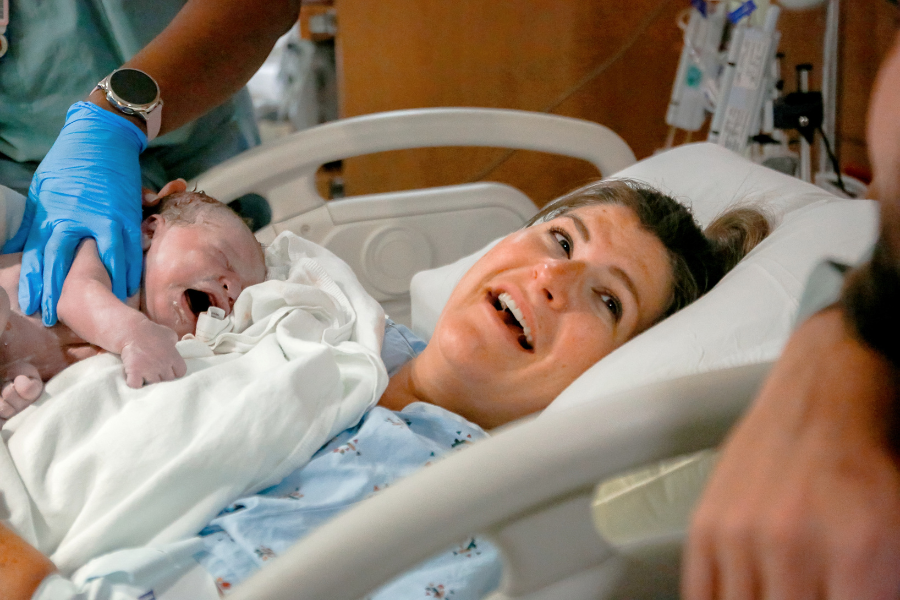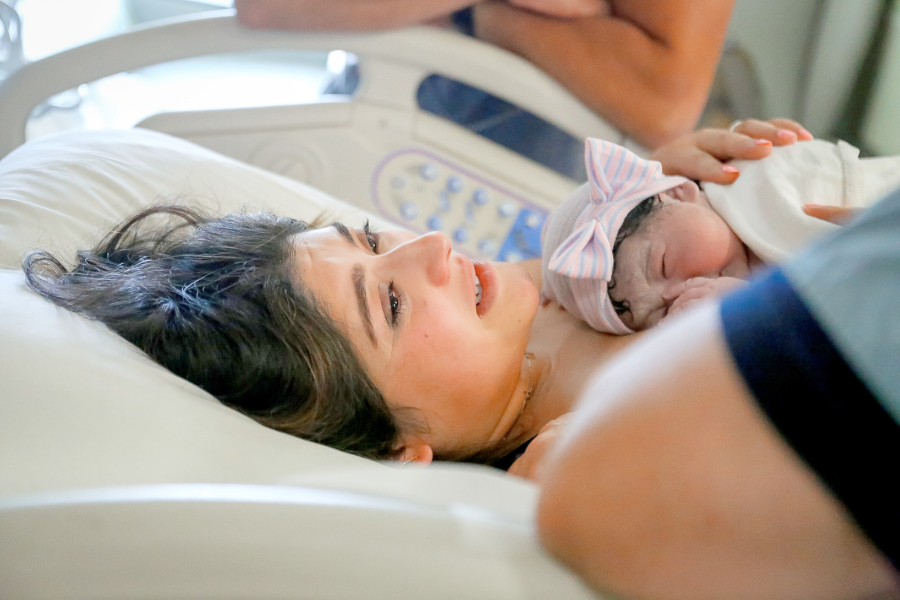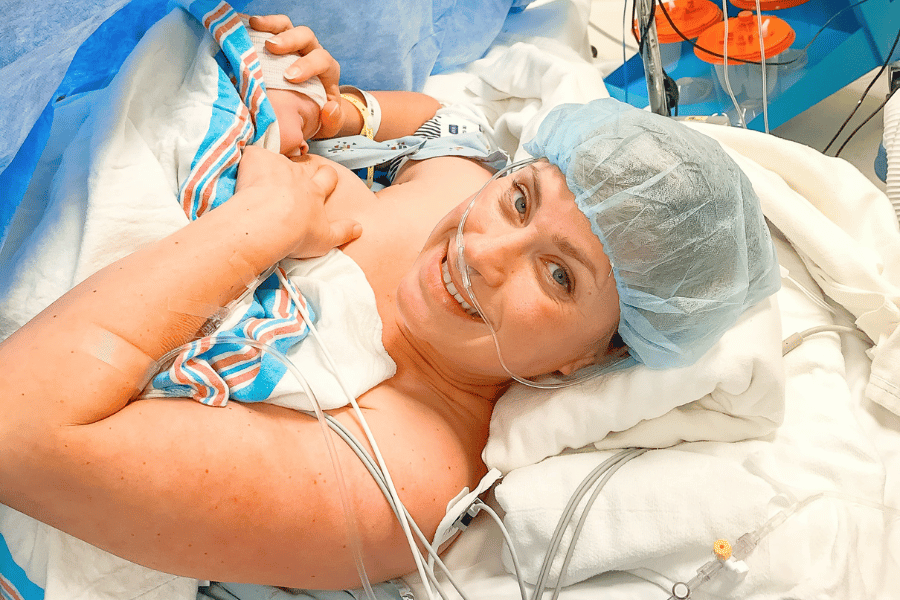I hope falling in pregnancy is something you never have to deal with, but the reality is that falls do happen. Taking a spill can be scary for anyone but is especially so when you are pregnant.
In this article I will talk all about falling while pregnant, including potential complications, when to worry, and ways to prevent falls during pregnancy.
Follow @mommy.labornurse on Instagram to join our community of over 650k for education, tips, and solidarity on all things pregnancy, birth, and postpartum!
Complications from falling while pregnant
Keep in mind that these are all potential complications. I am by no means implying that if you fall during pregnancy you will experience any or all of these things.
Your baby is protected and cushioned by your uterus and amniotic sac, so even if there is direct contact with your belly, there’s still no guarantee you will experience complications.
One thing I do recommend though is to call your provider if you experience a fall during pregnancy. You might think to yourself, “Oh, I didn’t fall on my belly.” or “My baby is still moving normally.”, but there could be something going on that’s not super obvious, so it’s always best to err on the side of caution!
Now let’s go through some of the more severe, potential complications you might experience from falling in pregnancy.
1. Contractions
There are actually several things, aside from labor, that can cause contractions during pregnancy. Dehydration is one of those things, but falls can also cause your uterus to contract.
It can be close to impossible to differentiate between true, cervix-changing contractions and others, so any number or severity of contractions following a fall would warrant a call to your OB provider.
If you are experiencing contractions after a fall, you can expect your provider to recommend an NST (depending on your gestational age) to check on baby’s heart rate and monitor the frequency of your contractions.
There are plenty of other reasons why your provider might suggest an NST at some point during your pregnancy, all of which you can read about below!
Related Reading: NST: Non Stress Tests During Pregnancy, Explained!
2. Placental abruption
Abdominal trauma is one of the causes of placental abruption. An abruption occurs when part or all of the placenta detaches from the uterine wall prior to birth. Abruptions can be partial or complete and are classified as mild or severe.
Mild abruptions – when a small part of the placenta detaches – usually don’t cause serious issues. Complete abruptions are more dangerous and can have some negative outcomes for both mom and baby if not treated appropriately.
3. Breaking your water
There is a potential that the impact from a fall could break your water. But keep in mind that your uterus is composed of some pretty strong muscles, so while this risk exists, it’s pretty unlikely to happen.
Should you notice any amount of fluid leaking following a fall be sure to report it to your provider. I know it can be tough to differentiate between normal pregnancy discharge, urine, and amniotic fluid, but if there’s ever any doubt, err on the side of caution!
Related Reading: All About Water Breaking During Pregnancy
4. Broken bones
Ouch! Broken bones are never fun but especially not when pregnant. I’m not even going to go into detail about this one, mainly because I’m far from an orthopedic nurse, but also because it would be very individualized based on the severity and location of the broken bones.
Red flags and when to see your provider
Like I said earlier, I would notify your provider should you experience any kind of fall during pregnancy. Let your provider be the one to decide whether or not they think you should be seen and evaluated.
If you choose not to notify your provider, or your provider doesn’t feel as if you need to be seen, keep these things in mind as red flags. Should you experience any of these things following a fall during pregnancy make sure to either promptly contact your provider or go to the hospital for evaluation.
- Vaginal bleeding
- Contractions
- Decreased or abnormal fetal movement
- Abdominal pain (related or unrelated to contractions)
Experiencing the above things after a fall, or really at any point during pregnancy, might be a cause for potential concern and a good reason to promptly notify your OB provider!
Related Reading: 5 Important Signs to Call Your Doctor When Pregnant!
Preventing falls during pregnancy
Falls during pregnancy are actually more common than you might think. A big baby bump can offset your center of gravity, making you more clumsy and more prone to falling. There are some things that you can do, however, to minimize your risk of falling during pregnancy.
1. Wear flat, comfortable shoes
The first thing I recommend is to wear comfortable, flat shoes. Come on ladies, take these 9 months as a pass on the high heel wearing, and instead put on the most comfy, flat shoes you can find! Nobody, I mean nobody, is going to call a pregnant lady out for this. And if they do, I highly recommend you let them have it!
2. Take your time and be aware of your surroundings
Another simple yet good reminder is to take your time and go slow when going from place to place.
Look around you and be aware of your surroundings, especially if you are in a new place or in slippery conditions. And don’t be too cool to use the handrail when going up and down steps!
3. Don’t carry heavy things up and down the stairs
And this probably goes without saying but leave the carrying stuff up and down stairs for your partner or someone else. You definitely don’t need any additional obstacles to potentially trip you up.
Final thoughts
There you have it, everything you ever wanted to know about falling in pregnancy, and more!
Like I said, I hope this is not something you have to deal with during pregnancy, but it’s better to have the information and not need it then to need it and not have it…at least that’s my theory!
To learn about some other things you may or may not experience during your pregnancy, make sure to read my other blog articles that are linked below!





